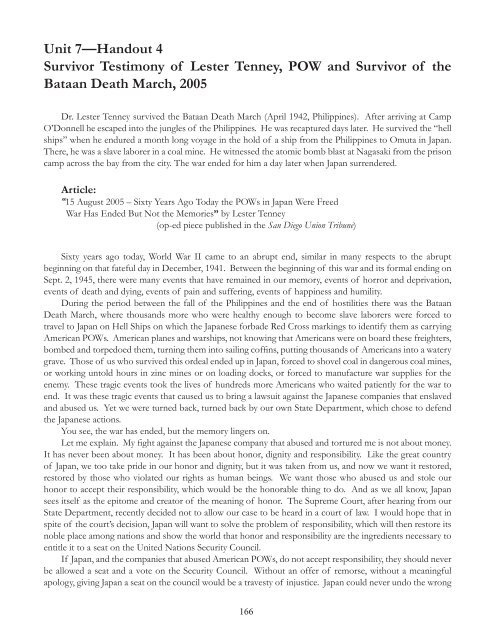Download - Canada ALPHA
Download - Canada ALPHA
Download - Canada ALPHA
Create successful ePaper yourself
Turn your PDF publications into a flip-book with our unique Google optimized e-Paper software.
Unit 7—Handout 4<br />
Survivor Testimony of Lester Tenney, POW and Survivor of the<br />
Bataan Death March, 2005<br />
Dr. Lester Tenney survived the Bataan Death March (April 1942, Philippines). After arriving at Camp<br />
O’Donnell he escaped into the jungles of the Philippines. He was recaptured days later. He survived the “hell<br />
ships” when he endured a month long voyage in the hold of a ship from the Philippines to Omuta in Japan.<br />
There, he was a slave laborer in a coal mine. He witnessed the atomic bomb blast at Nagasaki from the prison<br />
camp across the bay from the city. The war ended for him a day later when Japan surrendered.<br />
Article:<br />
“15 August 2005 – Sixty Years Ago Today the POWs in Japan Were Freed<br />
War Has Ended But Not the Memories” by Lester Tenney<br />
(op-ed piece published in the San Diego Union Tribune)<br />
Sixty years ago today, World War II came to an abrupt end, similar in many respects to the abrupt<br />
beginning on that fateful day in December, 1941. Between the beginning of this war and its formal ending on<br />
Sept. 2, 1945, there were many events that have remained in our memory, events of horror and deprivation,<br />
events of death and dying, events of pain and suffering, events of happiness and humility.<br />
During the period between the fall of the Philippines and the end of hostilities there was the Bataan<br />
Death March, where thousands more who were healthy enough to become slave laborers were forced to<br />
travel to Japan on Hell Ships on which the Japanese forbade Red Cross markings to identify them as carrying<br />
American POWs. American planes and warships, not knowing that Americans were on board these freighters,<br />
bombed and torpedoed them, turning them into sailing coffi ns, putting thousands of Americans into a watery<br />
grave. Those of us who survived this ordeal ended up in Japan, forced to shovel coal in dangerous coal mines,<br />
or working untold hours in zinc mines or on loading docks, or forced to manufacture war supplies for the<br />
enemy. These tragic events took the lives of hundreds more Americans who waited patiently for the war to<br />
end. It was these tragic events that caused us to bring a lawsuit against the Japanese companies that enslaved<br />
and abused us. Yet we were turned back, turned back by our own State Department, which chose to defend<br />
the Japanese actions.<br />
You see, the war has ended, but the memory lingers on.<br />
Let me explain. My fi ght against the Japanese company that abused and tortured me is not about money.<br />
It has never been about money. It has been about honor, dignity and responsibility. Like the great country<br />
of Japan, we too take pride in our honor and dignity, but it was taken from us, and now we want it restored,<br />
restored by those who violated our rights as human beings. We want those who abused us and stole our<br />
honor to accept their responsibility, which would be the honorable thing to do. And as we all know, Japan<br />
sees itself as the epitome and creator of the meaning of honor. The Supreme Court, after hearing from our<br />
State Department, recently decided not to allow our case to be heard in a court of law. I would hope that in<br />
spite of the court’s decision, Japan will want to solve the problem of responsibility, which will then restore its<br />
noble place among nations and show the world that honor and responsibility are the ingredients necessary to<br />
entitle it to a seat on the United Nations Security Council.<br />
If Japan, and the companies that abused American POWs, do not accept responsibility, they should never<br />
be allowed a seat and a vote on the Security Council. Without an offer of remorse, without a meaningful<br />
apology, giving Japan a seat on the council would be a travesty of injustice. Japan could never undo the wrong<br />
166


